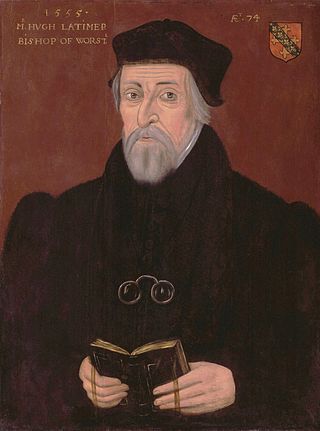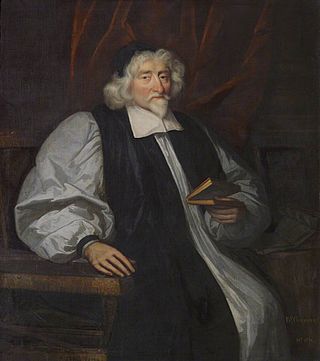Life
From Lancashire, Madew became Fellow of St John's College, Cambridge in 1530. He graduated M.A, in 1533, then B.D. in 1543 and D. D. in 1546. His appointment as Regius Professor was around 1545. He was vice-chancellor on four occasions. [1]
Madew became Master of Clare Hall after Roland Swynbourne, a committed Catholic, was ejected. He himself was removed from the post, after Queen Mary came to the throne in 1553. [2]
In 1548 as Vice-chancellor Madew stopped a proposed disputation by Roger Ascham on the Eucharist. [3] The next year, on 20 June, there was an official disputation on a similar topic. In the audience, in the philosophy schools, were William Parr, 1st Marquess of Northampton, and all the college Visitors. [4] Madew was required to defend the Protestant side, against Alban Langdale, William Glyn and others. [5] On that occasion Nicholas Ridley, there as a moderator of the discussion, frequently took up the argument rather than letting Madew speak. [6]
At the end of his life Madew was reconciled to the Catholic church. [1]

Hugh Latimer was a Fellow of Clare College, Cambridge, and Bishop of Worcester during the Reformation, and later Church of England chaplain to King Edward VI. In 1555 under the Catholic Queen Mary I he was burned at the stake, becoming one of the three Oxford Martyrs of Anglicanism.

Peter Gunning was an English Royalist church leader, Bishop of Chichester and Bishop of Ely.

Sir John Cheke (or Cheek) (16 June 1514 – 13 September 1557) was an English classical scholar and statesman. One of the foremost teachers of his age, and the first Regius Professor of Greek at the University of Cambridge, he played a great part in the revival of Greek learning in England. He was tutor to Prince Edward, the future King Edward VI, and also sometimes to Princess Elizabeth. Of strongly Reformist sympathy in religious affairs, his public career as provost of King's College, Cambridge, Member of Parliament and briefly as Secretary of State during King Edward's reign was brought to a close by the accession of Queen Mary in 1553. He went into voluntary exile abroad, at first under royal licence (which he overstayed). He was captured and imprisoned in 1556, and recanted his faith to avoid death by burning. He died not long afterward, reportedly regretting his decision.
The Regius Professorships of Divinity are amongst the oldest professorships at the University of Oxford and the University of Cambridge. A third chair existed for a period at Trinity College Dublin.

William Owen Chadwick was a British Anglican priest, academic, rugby international, writer and prominent historian of Christianity. As a leading academic, Chadwick became Dixie Professor of Ecclesiastical History in 1958, serving until 1968, and from 1968 to 1983 was Regius Professor of History. Chadwick was elected master of Selwyn College, Cambridge, and served from 1956 to 1983.

The Ascension Parish Burial Ground, formerly known as the burial ground for the parish of St Giles and St Peter's, is a cemetery off Huntingdon Road in Cambridge, England. Many notable University of Cambridge academics are buried there, including three Nobel Prize winners.

John Richardson was a Biblical scholar and a Master of Trinity College, Cambridge from 1615 until his death.

Richard Smyth was the first person to hold the office of Regius Professor of Divinity in the University of Oxford and the first Chancellor of the University of Douai.

John Prideaux was an English academic and Bishop of Worcester.

Henry Chadwick was a British academic, theologian and Church of England priest. A former dean of Christ Church Cathedral, Oxford – and as such, head of Christ Church, Oxford – he also served as master of Peterhouse, Cambridge.
Thomas Sedgwick (Segiswycke) was an English Roman Catholic theologian. An unfriendly hand in 1562 describes him as "learned but not very wise".
Robert Some (Soame) (1542–1609) was an English churchman and academic. Master of Peterhouse, Cambridge from 1589, Some played a prominent part in the ecclesiastical controversies of his time, taking a middle course, hostile alike to extreme Puritans and Anglicans.
Walter Haddon LL.D. (1515–1572) was an English civil lawyer, much involved in church and university affairs under Edward VI, Queen Mary, and Elizabeth I. He was a University of Cambridge humanist and reformer, and was highly reputed in his time as a Latinist. He sat as an MP during the reigns of Mary and Elizabeth. His controversial exchange with the Portuguese historian Jerónimo Osório attracted international attention partly on account of the scholarly reputations of the protagonists.

The CambridgeFaculty of Divinity is the divinity school of the University of Cambridge. It houses the Faculty Library.

John Young (1514–1580) was an English Catholic clergyman and academic. He was Master of Pembroke Hall, Cambridge, and was later imprisoned by Elizabeth I. He is not John Young (1534?–1605), Master of Pembroke Hall later in the century, and afterwards Bishop of Rochester.
Thomas Byng was an English academic and lawyer, Master of Clare Hall, Cambridge from 1571.

Henry James was an English clergyman and academic at the University of Cambridge, who served as President of Queens' College, Cambridge 1675–1717 and Regius Professor of Divinity 1699–1717.
This page is based on this
Wikipedia article Text is available under the
CC BY-SA 4.0 license; additional terms may apply.
Images, videos and audio are available under their respective licenses.












